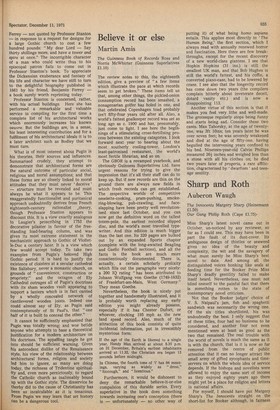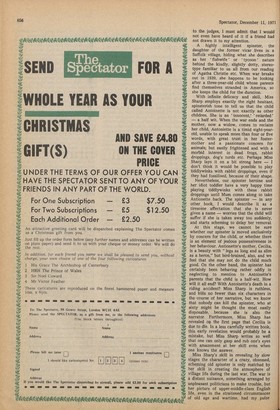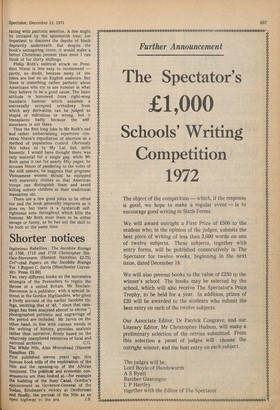Sharp and Roth
Auberon Waugh
The Innocents Margery Sharp (Heinemann £1.50) Our Gang Philip Roth (Cape M.75), Miss Sharp's latest novel came out in October, un-noticed by any reviewer, so far as I could see. This may have been in part the fault of its dust-cover. Its ambiguous design of thistles or seaweed gives no idea of the beauty and complexity, the wit and the savagery of what must surely be Miss Sharp's best novel to date. And among all the distinguished voices honking like seals at feeding time for the Booker Prize Miss Sharp's deadly gentility failed to make itself heard. Nevertheless, one must not blind oneself to the painful fact that there is something rotten in the state of contemporary novel criticism.
Not that the Booker judges' choice of V. S. Naipaul's jam, fish and spaghetti sandwich was necessarily the wrong one. Of the six titles shortlisted, his was undoubtedly the best. I only suggest that of these titles, four had no business to be considered, and another four not even mentioned were at least as good as the two that remained. The real trouble with the world of novels is much the same as it is with the church, that is it is now so far removed from the centre of public attention that it can no longer attract the small army of gifted sycophants and timeservers on which the whole idea of service depends. If the bishops and novelists were allowed to enjoy the same sort of income as they enjoyed eighty years ago there might yet be a place for religion and letters in national affairs.
For myself, I should have put Margery Sharp's The Innocents straight on the short-list for Booker although, in fairness
to the judges, I must admit that I would not even have heard of it if a friend had not drawn it to my attention.
A highly intelligent spinster, the daughter of the former vicar lives in a Suffolk village, hiding what she describes as her ' fishwife' or ' tycoon' nature behind the kindly, slightly dotty, stereo type familiar to us all from our reading of Agatha Christie etc. When war breaks out in 1939, she happens to be looking after a three-year-old child whose parents find themselves stranded in America, so she keeps the child for the duration.
With infinite delicacy and skill, Miss Sharp employs exactly the right hesitant, spinsterish tone to tell us that the child called Antoinette is not exactly as other children. She is an 'innocent,' retarded ' — a half wit. When the war ends and the mother, now a widow, comes to reclaim her child, Antoniette is a timid eight-yearold, unable to speak more than four or five words, with great trust in her fostermother and a passionate concern for animals; but easily frightened and with a morbid interest in dead frogs, rabbit droppings, dog's turds etc. Perhaps Miss Sharp lays it on a bit strong here — I don't think it would be possible to play tiddlywinks with rabbit droppings, even if they had fossilised, because of their shape.
Nevertheless, our spinster heroine and her idiot toddler have a very happy time playing tiddlywinks with these rabbit droppings until Mum comes along to take Antionette back. The spinster — in any other, book, I would describe it as a tiresome affectation that she is never given a name — worries that the child will suffer if she is taken away too suddenly, and starts scheming to delay her removal.
At this stage, we cannot be sure whether our spinster is moved exclusively by concern for the child, or whether there is an element of jealous possessiveness in her behaviour. Antionette's mother, Cecilia, is a beauty with "legs as long and as slim as a heron," but bird-brained, also, and we feel that she may not do the child much good. On the other hand, the spinster has certainly been behaving rather oddly in neglecting to mention to Antoinette's parents that the child is a half-wit. How will it all end? With Antoinette's death in a riding accident? Miss Sharp is ruthless, and kills no fewer than six characters in the course of her narrative, but we know that nobody can kill the spinster, who at sixty might be thought the most easily disposable, because she is also the narrator. Furthermore, Miss Sharp has revealed Ni the first page that Cecilia is due to die. In a less carefully written book, this early revelation would probably be a mistake, but Miss Sharp writes so well that one can only gasp and rub one's eyes with amazement at her skill even when one knows the answer.
Miss Sharp's skill in revealing by slow stages the character of a crazy, obsessed, scheming old spinster is only matched by her skill in creating the atmosphere of village life during the last war. The war is a distant nuisance, something arranged by unpleasant politicians to make trouble, but her picture of upper-middle-class English life, even in the straitened circumstances of old age and wartime, had my pulse
racing with patriotic emotion. A few might be irritated by the spinsterish tone, too impatient to discover the depths of black depravity underneath. But despite the book's uninspiring cover, it would make a better Christmas present than most I can think of for thirty shillings.
Philip Roth's satirical attack on President Nixon is less easy to recommend — partly, no doubt, because many of the jokes are lost on an English audience. But there is something rather pathetic about Americans who try to use humour in what they believe to be a good cause. The basic attitude is borrowed from right-wing mandarin humour which assumes a universally accepted orthodoxy from which any derivation can be judged as stupid or ridiculous or wrong, but it transplants badly because the selfassurance is not there.
Thus the first long joke in Mr Roth's sad and rather embarrassing repertoire concerns Nixon's repudiation of abortion as a method of population control. Obviously this takes us to My Lai, but, quite honestly, I would have thought there was only material for a single gag, while Mr Roth spins it out for nearly fifty pages; he accuses Nixon of pandering to the votes of the still unborn, he suggests that pregnant Vietnamese women should be equipped with maternity clothes so that American troops can distinguish them and avoid killing unborn children at their traditional massacres etc.
There are a few good jokes to be sifted out and the book generally improves as it goes on, but there is a hystericd1 selfrighteous note throughout which kills the humour. Mr Roth must learn to be either savage or funny, as he has not the skill to be both at the same time.












































 Previous page
Previous page